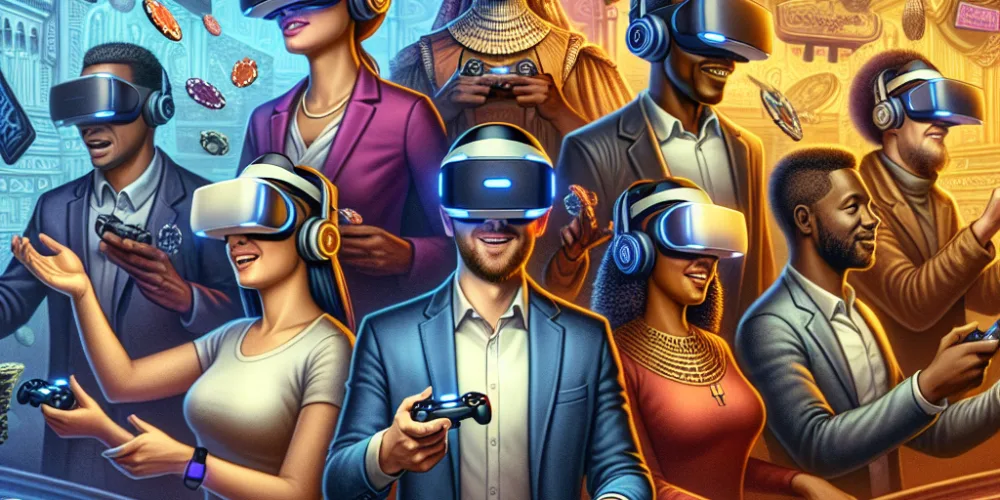In the dynamic world of gaming, innovation continues to reshape how players engage with their favorite pastimes. One of the most exhilarating developments in recent years has been the rise of virtual reality (VR) casinos. These platforms are not just transforming the traditional casino experience but also offering a new frontier for gaming enthusiasts and investors alike.
Virtual Reality Meets Traditional Gaming
Virtual reality technology immerses users in a three-dimensional environment where they can interact with objects and other players in real time. When applied to casinos, this technology enables players to walk through digitally recreated casinos, sit at game tables, handle chips, spin roulette wheels, and enjoy a full range of casino games as if they were in a Las Vegas casino — all from the comfort of their own homes.
Leading the charge in this VR revolution are companies like Oculus, a division of Meta Platforms Inc., and Valve, which have developed sophisticated VR headsets that deliver immersive and interactive user experiences. The integration of VR technology into gaming consoles like PlayStation and Xbox has further expanded the accessibility of VR casinos to a broader audience.
A Growing Market
The VR casino market is expanding at an impressive pace. According to recent industry analyses, the global VR market is expected to grow significantly, with a compound annual growth rate of over 30% in the next five years. This boom is attributed to technological advancements in VR software and hardware, as well as an increase in consumer demand for more engaging and interactive entertainment options.
One of the appealing aspects of VR casinos is their ability to attract a younger demographic. Millennials and Generation Z players, who seek immersive and interactive gaming experiences, are particularly drawn to VR casinos. These platforms offer a blend of gaming and social interaction, which is highly valued by younger players who favor multiplayer and community-driven experiences.
Games and Features
VR casinos are not limited to traditional casino games. They also offer a wide array of gaming options, including slots, blackjack, poker, roulette, and more. Some VR platforms have started experimenting with live dealer games, where a real person deals cards in a virtual environment, enhancing the authenticity and engagement levels.
Beyond gaming, VR casinos can provide other entertainment services, like virtual concerts, sports betting zones, and VR bars and lounges, creating a well-rounded entertainment experience. This versatility not only enhances user engagement but also opens up new revenue streams for operators.
Regulatory and Security Challenges
Despite the promising growth, VR casinos face significant regulatory and security challenges. Different jurisdictions have varied regulations concerning gambling, and adapting these to the virtual realm can be complex. Additionally, ensuring the security of financial transactions and personal data is paramount, as these platforms might be particularly vulnerable to cyberattacks.
Developers and operators of VR casinos are continuously working on innovative solutions to address these issues. Blockchain technology, for instance, has been integral in enhancing the transparency and security of transactions within VR platforms.
The Future Landscape
Looking ahead, the future of VR casinos seems robust. Innovations in VR technology, like improved graphics and more responsive user interfaces, will likely continue to enhance the user experience. Moreover, as VR devices become more affordable and widespread, a larger demographic will likely explore VR casinos, potentially making this niche a mainstream phenomenon.
As we stand on the brink of what might be a major shift in the gaming and gambling industries, stakeholders—from technology developers to casino operators—are keenly watching the growth trajectory of VR casinos. The blend of technology, gaming, and entertainment holds promising potential, not just as a business opportunity but also as a redefinition of what it means to engage with the digital world.
In conclusion, VR casinos represent not just a technological evolution but a significant cultural shift in how people interact with digital environments and communities. As this exciting industry continues to expand, it will undoubtedly influence how future generations perceive and enjoy gaming and entertainment.

Karine Gomez is an enthusiastic writer and avid gamer with a particular love for PlayStation and casino gaming. Her deep knowledge of gaming trends and casino dynamics makes her articles both informative and engaging. Karine’s passion for PlayStation games and her firsthand experience with casino play shine through in her writing, offering readers authentic insights and valuable tips.

